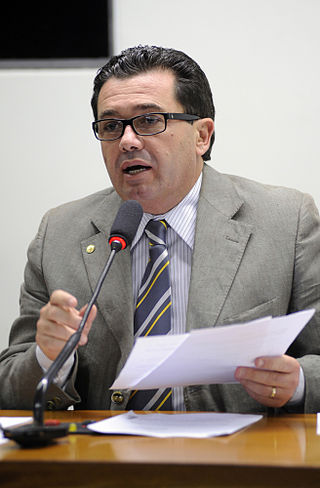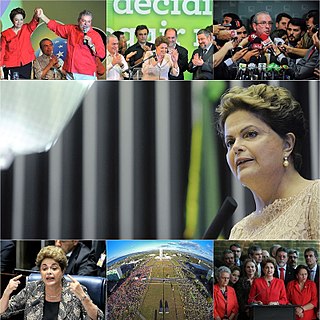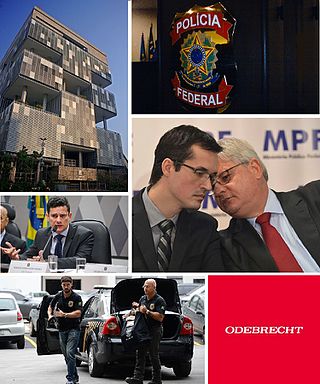This article has multiple issues. Please help improve it or discuss these issues on the talk page . (Learn how and when to remove these messages)
|
In Brazil, several parliamentary inquiries (CPIs) have been established over the years.
This article has multiple issues. Please help improve it or discuss these issues on the talk page . (Learn how and when to remove these messages)
|
In Brazil, several parliamentary inquiries (CPIs) have been established over the years.
In Brazil, the first draft of what would become the future CPI dates back to the time of the Empire, amid the Paraguayan War. The Senate studied the creation of a commission, similar to the current CPIs, to investigate alleged failures of the Brazilian government in the military conflict with the neighboring country. The request was presented in 1867, when the war was two and a half years old, by Senator Silveira da Mota. According to him, the Senate needed to investigate why the combat was consuming so much money from the public coffers and peace was not being achieved. After heated debates at the Palácio do Conde dos Arcos, the headquarters of the imperial Senate in Rio de Janeiro, the senators decided to bury the proposal. [1]
The first constitution to establish the CPI was the 1934 Constitution, but only for the Chamber of Deputies. Only the Chamber could create the CPIs. [2]
The 1937 Constitution, decreed by Getúlio Vargas, was silent regarding the CPIs. [3] They returned in the 1946 Constitution, where they were provided for the first time for both houses of the Legislative Branch: the Chamber of Deputies and the Federal Senate. [2] [3]
In the 1988 Constitution, the CPIs are regulated in Article 58, Paragraph 3: "The parliamentary investigative commissions, which shall have powers of investigation inherent to judicial authorities, in addition to others provided for in the internal regulations of their respective Houses, shall be created by the Chamber of Deputies and by the Federal Senate, jointly or separately, upon request by one-third of their members, for the investigation of a specific fact and for a specified period, and their conclusions, if applicable, shall be forwarded to the Public Prosecutor's Office, for the purpose of promoting civil or criminal liability of the offenders."[ citation needed ]
The request for the establishment of a CPI in Congress can be made by one-third of the Senators or one-third of the Federal Deputies. In the Senate, for example, composed of 81 senators, 27 signatures are required. The Supreme Court has already ruled, in defense of parliamentary minorities, in the Writ of Mandamus No. 26,441 that if there is such a request from 1/3 of the members of the legislative body and the other requirements required by law are met, the majority cannot attempt to obstruct the installation of the CPI by referring the matter to the plenary for judgment.
When a CPI is composed jointly by the Senate and the Chamber of Deputies, it is called a Mixed Parliamentary Inquiry Commission. Even in this case, however, it is commonly referred to by the media and the Brazilian society as CPI, instead of CPM. In this case, in addition to the 27 signatures of the senators, the support of 171 deputies is also required, exactly one-third of the members of the Chamber.

The Federal Constitution requires that the CPI investigate a specific fact, but there is no obstacle to creating a new CPI or adding to the current one if a new relevant fact that needs to be investigated is identified.
Once the minimum required signatures have been collected, the request for opening the investigation with a description of the facts to be investigated is presented to the board of directors, which reads it in plenary. However, this is not enough for it to function. It is still necessary for the parties that have representation in the House to appoint members to the commission, and only then is its effective installation carried out. The work should last 120 days, which can be extended as many times as necessary within the same .
The non-establishment of the CPI due to the omission of the House board of directors in appointing the members of the CPI infringes on the subjective right of the minorities to see the parliamentary inquiry established, in support of the right of opposition, as already decided by the Supreme Court in the Writ of Mandamus No. 24,831/DF.
After concluding the investigations, the Parliamentary Inquiry Commission may send its findings, if applicable, to the Public Prosecutor's Office, so that it can promote the civil or criminal liability of the accused.
The work schedule of a Parliamentary Inquiry Commission is determined by its members, who will define the investigations and the taking of testimonies. The final report is the exclusive responsibility of the rapporteur, who must be chosen by vote.
All inquiries, external hearings, and summoning of testimonies must be approved by the plenary of the CPI, in accordance with the principle of collegiality.
To carry out its work, the CPI has the same investigative powers as a judicial authority and, therefore, through a reasoned decision of its plenary, it can:
However, the powers of the CPIs are not identical to those of magistrates, as the latter have some powers guaranteed by the Constitution that are not granted to the Parliamentary Commissions, considering the understanding of the Supreme Federal Court (Writ of Mandamus No. 23,452) that such powers are reserved by the Constitution only for magistrates. Thus, the CPI cannot:
It is a well-established jurisprudence of the Supreme Federal Court that the investigated or accused party has the possibility to remain silent, avoiding self-incrimination (HC 89269). From this guarantee, the following rights arise for the person under investigation, and even for witnesses: a) to remain silent in the face of questions whose answers may imply self-incrimination; b) not to be arrested in flagrante for exercising this constitutional prerogative, on the pretext of committing the crime of disobedience (Article 330 of the Penal Code), nor for perjury (Article 342 of the same Code); and c) not to have silence interpreted against them. (HC 84,214-MC, Rel. Min. Cezar Peluso, monocratic decision, judgment on April 23, 2004, DJ on April 29, 2004)
The investigative powers of the CPI can only be exercised by the members or by a member of the CPI with the prior and express authorization of this commission by majority decision (Article 47 of the Federal Constitution). Without this, the exercise of any of these powers – by any member, even by the president or the rapporteur of the CPI – is arbitrary and can be challenged or rectified through legal action, including constitutional remedies, especially habeas corpus and writ of mandamus.
Parliamentary immunity, also known as legislative immunity, is a system in which political leadership position holders such as president, vice president, minister, governor, lieutenant governor, speaker, deputy speaker, member of parliament, member of legislative assembly, member of legislative council, senator, member of congress, corporator, councilor etc. are granted full immunity from legal prosecution, both civil prosecution and criminal prosecution, in the course of the execution of their official duties.

José Dirceu, in full José Dirceu de Oliveira e Silva, is a former Brazilian politician. His political rights were suspended by the Brazilian House of Representatives and he was found guilty by the Brazilian Supreme Court of active corruption and conspiracy in two separate lawsuits.

The Mensalão scandal was a major parliamentary alleged vote-buying scandal by Luiz Inácio Lula da Silva's administration that threatened to bring down his government in 2005. Mensalão is a neologism, an augmentative variant of the word for "monthly payment".

The president of the Federal Senate, sometimes referred to as the President of the Senate, is the presiding officer of the Federal Senate of Brazil.

Corruption in Brazil exists on all levels of society from the top echelons of political power to the smallest municipalities. Operation Car Wash showed central government members using the prerogatives of their public office for rent-seeking activities, ranging from political support to siphoning funds from state-owned corporation for personal gain. The Mensalão scandal for example used taxpayer funds to pay monthly allowances to members of congress from other political parties in return for their support and votes in congress. Politicians also used the state-owned and state-run oil company Petrobras to raise hundreds of millions of reais for political campaigns and personal enrichment.

Benedito Lyra is a Brazilian politician from Alagoas, member of Progressistas (PP), former Senator for his state and incumbent Mayor of Barra de São Miguel.

Vital do Rêgo Filho is a Brazilian politician and doctor. He represented Paraíba in the Federal Senate from 2011 to 2014. Previously, he was a Deputy from Paraíba from 2007 to 2011. He was a member of the Brazilian Democratic Movement Party. Assumed office in the Federal Court of Accounts on December 22, 2014, appointed by president Dilma Rousseff. In the Senate, senator Raimundo Lira took office in his place.

The impeachment of Dilma Rousseff, the 36th president of Brazil, began on 2 December 2015 with a petition for her impeachment being accepted by Eduardo Cunha, then president of the Chamber of Deputies, and continued into late 2016. Dilma Rousseff, then more than 12 months into her second four-year term, was charged with criminal administrative misconduct and disregard for the federal budget in violation of article 85, items V and VI, of the Constitution of Brazil and the Fiscal Responsibility Law, Article 36. The petition also accused Rousseff of criminal responsibility for failing to act on the scandal at the Brazilian national petroleum company, Petrobras, on account of allegations uncovered by the Operation Car Wash investigation, and for failing to distance herself from the suspects in that investigation.

Onyx Dornelles Lorenzoni is a Brazilian politician, businessman, and veterinarian. A member of the Liberal Party (PL), he served as a federal deputy from Rio Grande do Sul for five terms. After the 2018 Brazilian general election, the president-elect Jair Bolsonaro invited Lorenzoni to be his Chief of Staff. He was also designated leader of the transition team.

The 56th Legislature of National Congress was a meeting of the legislative branch of the Federal Government of Brazil, composed by the Federal Senate and the Chamber of Deputies. It convened in Brasília on 1 February 2019, a month after the beginning of Jair Bolsonaro's only term as president, and ended on 31 January 2023.
A special election for the position of president of the Chamber of Deputies of Brazil took place on July 14, 2016, during the 55th legislature. The election was necessary due to the resignation of Eduardo Cunha, announced on the 7th of that month. According to the Brazilian Constitution, the president of the Chamber of Deputies is the second in line of succession to the Presidency of the Republic.

A long series of criminal investigations have occurred in Brazil associated with Operation Car Wash. The first investigation was launched in March 2014, and is now known as phase 1 of the investigation, with subsequent inquiries numbered sequentially and having code names such as phase 2, phase 3, and so on. By February 2021, there were 80 announced phases of Operation Car Wash.

The Odebrecht–Car Wash leniency agreement, also known in Brazil as the "end of the world plea deal", was the leniency agreement signed between Odebrecht S.A. and the Public Prosecutor's Office (PGR) in December 2016, as part of Operation Car Wash. The agreement provided for the deposition of 78 of the contractor's executives, including the former president Marcelo Odebrecht, and his father, Emílio Odebrecht, which generated 83 investigations at the Supreme Federal Court (STF).

Patrícia Lúcia Saboya Ferreira Gomes is a Brazilian teacher, writer, and politician.
The National Brazilian Congress has a bicameral system, with the Chamber of Deputies and the Federal Senate. Women are extremely underrepresented in both parts of the Congress. Between 1983 and 2015 women only made up on average 7.2% of seats in the Senate, and 6.2% of seats in the Chamber of Deputies. While the majority of seats on both the Senate and the Chamber of Deputies were held by male politicians.

The electoral system of Brazil is the set of means used to choose representatives and government members of the Federative Republic of Brazil. The current system is defined by the 1988 Constitution and the Electoral Code, in addition to being regulated by the Superior Electoral Court as delegated by law. The Constitution itself already defines three distinct electoral systems, which are detailed in the Electoral Code: proportional elections for the Chamber of Deputies, mirrored in the legislative powers at the state and municipal levels, majority elections with one or two elected representatives to the Federal Senate and majority elections in two rounds for president and other executive heads in other spheres.

The JBS Testimonies in Operation Car Wash refer to the leniency agreement signed between the company JBS and the Office of the Attorney General of Brazil (PGR) in April 2017, within the scope of Operation Car Wash. The Brazilian Supreme Federal Court (STF) approved the agreement on May 18, 2017, based on the plea bargain of the owners Joesley and Wesley Batista and executives of the company. On September 14, 2017, former Attorney General Rodrigo Janot rescinded the agreement with Joesley and Ricardo Saud due to suspicions of obstruction of investigation by the collaborators. The following year, Attorney General Raquel Dodge rescinded the agreement with Wesley Batista and Francisco de Assis e Silva due to their omission of criminal facts of which they were aware.
The JBS Parliamentary Inquiry Commission, better known as JBS CPI or JBS CPMI, is a Parliamentary Inquiry Commission created on September 5, 2017, with the purpose of investigating alleged irregularities committed by the J&F group, which controls the JBS meatpacking company, in relation to loans from the Brazilian Development Bank (BNDES) between the years 2007 and 2016, as well as the plea bargain agreement made by the group with the Federal Public Prosecutor's Office.
A Parliamentary Inquiry Committee is an investigation committee of the legislative branch, which transforms the parliamentary house itself into a committee to hear testimonies and gather information directly. At the municipal level, its correct name is Special Inquiry Committee.

Paulo Roberto Severo Pimenta is a Brazilian journalist, agricultural technician, and politician, who is the current of Secretary of Social Communication under president Luiz Inácio Lula da Silva. He has been a member of the Workers' Party (PT) since 1985.